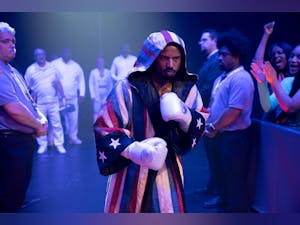From: Silver Screen
REVIEW: ‘Who We Are: A Chronicle of Racism in America’ explores the uncomfortable truth of white supremacy in America

This review contains spoilers for “Who We Are: A Chronicle of Racism in America.”
There’s a moment in “Who We Are: A Chronicle of Racism in America” where Jeffery Robinson — the narrator and architect of the films argument — speaks with a man defending the Confederate flag and claiming that the Civil War wasn’t about slavery. Robinson tries to have a productive conversation with the man, but it is evident that this frustrating effort is taking a toll on him. This theme of white Americans retreating from uncomfortable information recurs throughout “Who We Are” and forms a central point in its argument.
Simply put, “Who We Are” is the story of America. Robinson tells this tale through a lecture interspersed with visits to historic sites connected to white supremacy in America. He builds an ironclad case to prove that not only was the Civil War fought over slavery, but also that almost every era of American history was shaped by white supremacy.
One of the great accomplishments of the film is how accessible its message is. After 30 years of work as a defense attorney, Robinson became a skilled storyteller who knows how to bring his audience with him. Without ever leaving the audience behind, he draws a direct line between the wealth slavery generated for its white perpetrators and the decision made by southern states to leave the Union and initiate the Civil War. Because of this ability to bring everyone along for the ride, “Who We Are” skillfully educates even those who had little knowledge of the subject coming into the film.
This makes the documentary a great opening output from the Who We Are Project, a group founded by Robinson himself. This organization is dedicated to correcting the narrative of American history and the role that white supremacy has played and continues to play in the founding and contemporary decision making process of our country. “Who We Are” serves that mission well by being both an educational tool as well as a guide to foster continuing thought and conversations among its viewers.
Robinson’s emphasis on sparking personal conversations about racism extends to the onscreen events as well. In a particularly emotional scene, Robinson converses with a childhood friend and his older brother, Opie, in a classroom at their old elementary school. Opie tells Robinson for the first time that during their childhood, their basketball team was briefly denied entry to a game in Mississippi because of Jeffery’s race. the older brother found himself at a crossroads: either withdraw the team, or declare that the team would only play if Robinson could. In the end, the other school blinked — and the game carried on as scheduled. Even after three decades, Jeffery remained unaware of the incident. This conversation is a prime example of what “Who We Are” hopes to inspire: difficult, heartfelt conversations on racism in America and, based on the effect it had on its creators, it will be successful in doing so — provided you watch the film.
“Who We Are: A Chronicle of Racism in America” was released in theaters on Feb. 4.
Editor's Note: A previous version of this article contained errors about the narrator's family.




